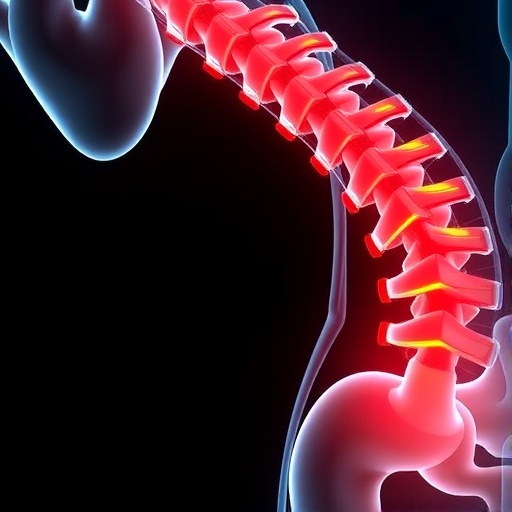In an exciting development within the realm of genetic therapies, recent research has illuminated the potential of targeted gene transfer in addressing one of the most challenging aspects of bone health: inflammatory bone loss. The study conducted by a team led by renowned scientists, Yu, Li, and Herbert, delves into the promising anti-inflammatory effects of MAPK phosphatase-1 (MKP-1), a critical regulator of inflammation in bone tissues. By embracing an innovative approach to local gene transfer, researchers aim to combat the detrimental impacts of chronic inflammation that often precede and exacerbate conditions like osteoporosis and other osteoporotic fractures.
The research highlights the crucial role MKP-1 plays in modulating the inflammatory pathways associated with various bone pathologies. Inflammation, while an essential part of the body’s immune response, can lead to bone degradation when it becomes chronic. The findings from this study suggest that by increasing the local expression of MKP-1 in bone tissues, it is possible to significantly reduce inflammatory responses, providing a protective effect against the resorption of bone tissue.
Utilizing local gene transfer methods, the researchers focused on delivering the MKP-1 gene directly into the target sites within the bone. This approach not only enhances the specificity of the therapeutic action but also minimizes the risk of systemic side effects that can often be associated with broader administration routes. The technique explores the delivery mechanisms that enable efficient uptake of genetic material within targeted bone cells, specifically osteoblasts and osteoclasts, which are pivotal in maintaining bone homeostasis.
The study rigorously tested the efficacy of the local gene transfer strategy through a series of preclinical models, underlining its potential translatability into clinical settings. Specifically, the experimental designs were meticulously crafted to monitor bone density and structural integrity following the intervention. Notably, the results demonstrated a marked improvement in bone mass and strength, underscoring the therapeutic potential of leveraging gene therapies to manage inflammation and its consequences on bone health.
Additionally, the researchers employed advanced imaging techniques, such as micro-CT scans and histological analyses, to visualize the changes in bone architecture. These imaging modalities allowed for precise measurements of bone density and morphology, facilitating a comprehensive understanding of the biological impact of the gene transfer intervention. Such technological integration underscores the necessity of multidisciplinary approaches in tackling complex health issues, thereby paving the way for future innovations in gene therapy.
The potential clinical implications of this research are profound. With the rise of aging populations globally, conditions that lead to inflammatory bone loss, such as rheumatoid arthritis and other autoimmune disorders, are increasingly prevalent. Current therapeutic options often fall short due to side effects related to long-term use or ineffectiveness in halting disease progression. The specificity and localized nature of MKP-1 gene transfer could revolutionize treatment strategies, offering a feasible solution that targets the root cause of inflammation rather than merely managing symptoms.
Moreover, the study signifies a shift towards utilizing molecular biology techniques in regenerative medicine. By harnessing the body’s intrinsic healing processes, such genetic interventions may usher in a new era of personalized medicine—tailoring treatments to individuals based on their unique genetic profiles and health contexts. Such approaches stand to not only enhance therapeutic efficacy but also promote safer treatment alternatives with reduced risk profiles.
However, while the results are indeed promising, researchers remain cautious regarding the complexities involved in translating these findings into clinical practice. Questions concerning the efficiency of gene delivery, the long-term expression of the introduced genes, and potential off-target effects must be rigorously addressed in future studies. Ongoing investigations will be vital in confirming the safety and efficacy of the MKP-1 gene transfer approach, setting the stage for potential Phase I clinical trials.
The backbone of this research thrives on interdisciplinary collaboration, bringing together experts from genetics, molecular biology, osteology, and clinical medicine. Such collaborative efforts are essential in navigating the intricate landscape of developing effective gene therapies. It emphasizes the need for ongoing dialogue and partnership among scientists, clinicians, and regulatory bodies, as they together strive to bring innovative therapies from the laboratory bench to the patient’s bedside.
Public awareness and understanding of these scientific advancements are just as crucial as the research itself. The potential of gene therapies to address long-standing issues within orthopedics heralds a new wave of optimism in patient care. As the scientific community works towards demystifying the complexities of gene technology, public engagement through education and outreach initiatives becomes vital. A well-informed public is essential in fostering an environment conducive to the testing and acceptance of novel therapies.
In conclusion, the work done by Yu, Li, Herbert, and their team stands as a significant leap forward in the field of gene therapy. By targeting inflammatory bone loss through localized MAPK phosphatase-1 gene transfer, they are positioning themselves at the forefront of a revolutionary treatment paradigm. As researchers move forward, building upon these foundational findings, there is hope for a future where targeted gene therapies can restore bone health and enhance the quality of life for millions suffering from inflammatory bone disorders. The horizon looks bright for genetic innovation, with potential applications extending beyond musculoskeletal disorders, marking a transformative trajectory in medical science.
Subject of Research: Local Gene Transfer for Inflammatory Bone Loss
Article Title: Correction: Anti-inflammatory effect of MAPK phosphatase-1 local gene transfer in inflammatory bone loss.
Article References:
Yu, H., Li, Q., Herbert, B. et al. Correction: Anti-inflammatory effect of MAPK phosphatase-1 local gene transfer in inflammatory bone loss.
Gene Ther (2025). https://doi.org/10.1038/s41434-025-00579-w
Image Credits: AI Generated
DOI: 10.1038/s41434-025-00579-w
Keywords: MAPK phosphatase-1, gene transfer, inflammatory bone loss, osteoblasts, osteoclasts, gene therapy, bone health, chronic inflammation, molecular biology, personalized medicine.




